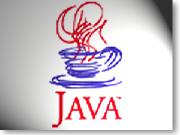
| Pendle.Net -> News -> Internet (Latest) -> Internet: 08Dec1998 |
Internet Story: 08 Dec 1998
 |
|
Sun Announce Java 2 Today Sun Microsystems announced the release of the next generation of Java technologies. Sun are also following Netscape into the open source arena. They are to change their current licensing model to combine licensing of Java 2 with the open source code model a movement with growing momentum where programmers download the software for free, modify it and share it with others. Sun intends to collect its license fee when developers need to get their products Java Certified (and able to carry the Java logo). Now, if MS and Netscape could only get their Java engines to work properly in their browsers we'd all be a lot happier!
AT&T buys IBM.NET In a $5 billion cash deal, AT&T today announced that they would acquire IBM Global Network business. The two companies will also enter into outsourcing contracts with each other, which could represent an additional $2.5 billion in revenue to AT&T. IBM will outsource a portion of its global networking needs to AT&T, while AT&T plans to outsource applications processing and data center management to IBM. About 5,000 IBM employees will join AT&T as part of the acquisition. See the IBM Press Release for details.
New US Net Czar Named Looks
like I missed what was happening in the US. As the UK government were announcing the
job availability for Net Czar, Al Gore was naming a new Net Czar, David Beier (the head
domestic policy adviser to Gore and a
former official with Genentech Inc., a San Francisco biotech company) will replace Ira
Magaziner.
2.4M Net Using Children in the UK According to a BBC report, there are 2.4 million children in the UK (that's about a third of all children) that are using the Internet. In a poll done by NOP, 20% of children between the ages of 6 and 16 were uncomfortable with something that they had seen on it. Of that 20%, 40% of them had seen something that they defined as being "rude". These figures were described by Rob Lawson, of NOP, as a "significant minority". The survey, called Kids.net, was paid for by Microsoft, the BBC, NatWest and Anglia Multimedia in syndicate. The Department of Trade and Industry's forthcoming review on Internet regulation is expected to be published before Christmas.
Careful Where You Advertise In a recent paper in the Journal of Experimental Psychology: Applied, Brad Bushman of the University of Iowa presented research about effects of television violence on memory for adverts. He demonstrated that the anger produced in the viewer by the violent content diminished recollection of advertising content of commercial breaks. Not a great surprise really, I would have thought - bit like state conditioned learning (where you learn something whilst in a certain "state", anger in this case, which cannot easily be recalled in another state, e.g. non-anger. Maybe web advertisers should be wary about where they place their ads - do you want your ads on sites that are, sexually arousing, violent, etc.? (Maybe this is the reason why I can't recall what ads are on Microsoft's site - pictures of Bill Gates inducing anger & violent behavior :-))
Big Brother is Watching You Be Free today will announce the issuance of a patent covering automated profiling of Web users for targeted advertising. Patent #5,848,396, "Computer Program Apparatus for Determining Behavioral Profiles of a Computer User," covers five steps in profiling users and serving them Web advertising:
| The automatic creation of user profiles, which include what sites users visit and what type of information they access | |
| The delivery of that same type of data to users when they view banner ads or affiliate-site links and logos | |
| The targeted selection of what products to advertise to various users based on the profiles | |
| The ability to augment those profiles based on how users respond to the advertisements they are served | |
| The ability to alter advertisements served to the user based on those augmented profiles |
The patent was filed in April 1996, before
most e-commerce was around. Not only may this patent upset the apple cart with
several web advertising systems but it also poses privacy
problems about collection of non-anonymous data about users.
Side Effects of Booming E-Commerce I mentioned the other day that one of the industries well placed to take full advantage of the boom in e-commerce are the catalogue retailers. There's also another industry sector that will see great times ahead and that is the shipping industry (no not boats and ships, as in "shipping" products from warehouses to your doorstep). People like Federal Express and UPS are already reporting massive increases in business this year due to the increase in online shopping. However, it's not easy to measure just how much business is being generated by e-commerce and just how much is generated by traditional methods, so it's hard for these companies to plan capacity for increases or determine just what percentage of revenue is generated by e-commerce. "When packages come through our system, one is not stamped 'e-commerce' and one is not stamped 'traditional purchase,' " UPS spokesman Steve Holmes said. "I have not yet found anyone who could put a number on what the actual increase is" from Internet transactions, he said. See LA Times Article for more info.
Andrew Stringer, © Pendle.Net Ltd, 1998